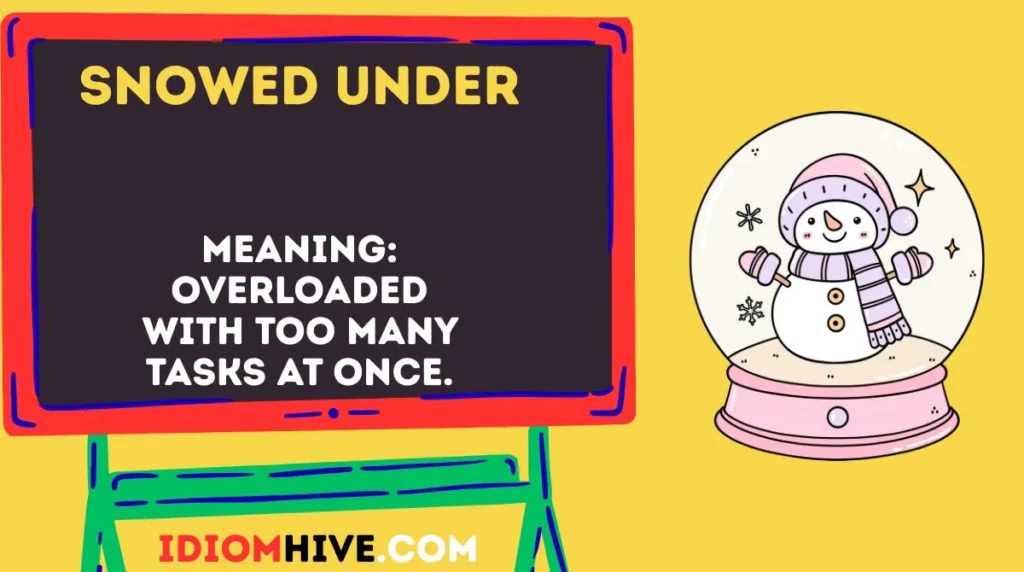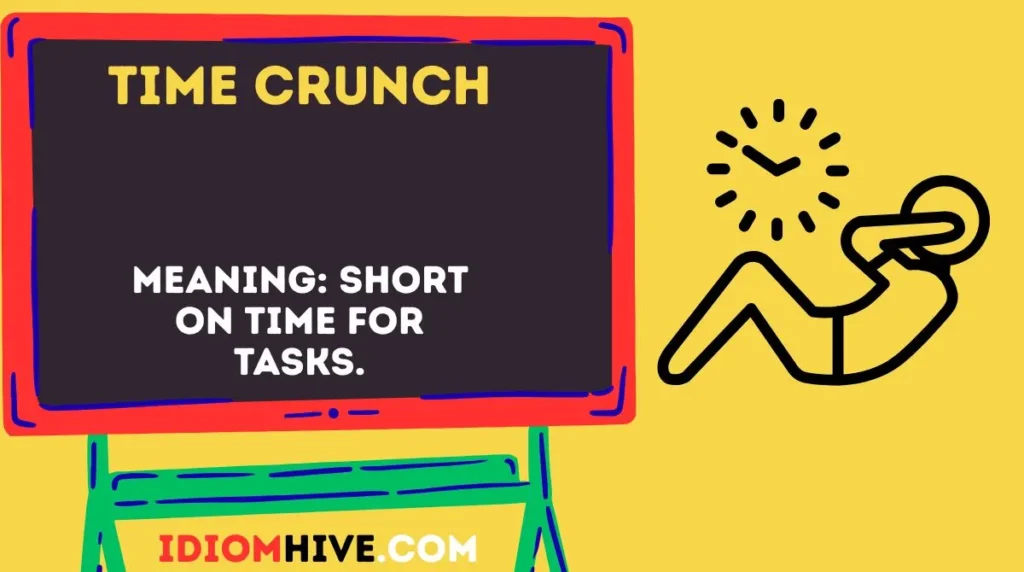Life today is fast, hectic, and full of responsibilities. One of the best ways to capture this sense of constant activity is through idioms. Idioms are colorful phrases whose meanings are not always clear from the words themselves.
They make English richer, more natural, and more expressive. Instead of simply saying “I am very busy”, you can say “I’m swamped with work” or “I’m up to my ears in tasks”.
Using idioms for busy not only improves communication but also helps you sound more fluent and confident.
Busy idioms are especially useful in daily conversations, workplaces, schools, and even informal chats.
They add variety, show personality, and often make the language more fun. Whether you want to describe being overloaded, always moving, or juggling too many things, there’s an idiom for it.
Did You Know?
The idiom “a bee in one’s bonnet” dates back to the 1500s and comes from the image of a buzzing bee trapped under a hat—impossible to ignore, just like a busy or restless thought!
Idioms Showing Overwork and Overload
Swamped with Work
Meaning: Extremely busy, with more tasks than you can handle.
Example: I can’t join the party tonight—I’m swamped with office deadlines.
Alternative: Buried in work.
Note: Common in workplaces and professional settings.
Snowed Under

Meaning: Overloaded with too many tasks at once.
Example: She’s snowed under with assignments this week.
Alternative: Drowning in work.
Note: Used in both formal and informal speech.
Up to My Ears
Meaning: Completely occupied with work or responsibilities.
Example: I’m up to my ears in paperwork right now.
Alternative: Up to my neck.
Note: Popular in casual conversations.
Buried in Work
Meaning: Overwhelmed with a heavy workload.
Example: He’s buried in work after returning from vacation.
Alternative: Piled up with work.
Note: Very common in professional contexts.
Burning the Candle at Both Ends
Meaning: Working too hard or late without enough rest.
Example: She’s been burning the candle at both ends to finish her project.
Alternative: Working around the clock.
Note: Often used when someone looks exhausted.
Spread Too Thin
Meaning: Taking on more tasks than possible.
Example: He agreed to help everyone and now he’s spread too thin.
Alternative: Overcommitted.
Note: Common in workplace or personal planning contexts.
Drowning in Work
Meaning: Feeling overwhelmed by too much work.
Example: I can’t meet you today—I’m drowning in work.
Alternative: Snowed under.
Note: Informal but widely used.
In Over One’s Head
Meaning: Having more responsibility than one can manage.
Example: She realized she was in over her head after accepting the promotion.
Alternative: Bit off more than you can chew.
Note: Can be professional or casual.
Chained to the Desk
Meaning: Having no free time because of constant work.
Example: He’s been chained to his desk all week.
Alternative: Tied up at work.
Note: Often said humorously.
Round the Clock
Meaning: Working continuously, day and night.
Example: The doctors worked round the clock to save lives.
Alternative: Day and night.
Note: Often used in formal or serious situations.
Idioms for Constant Activity and Movement
Like a Bee in a Hive
Meaning: Always busy, moving around with purpose.
Example: The kitchen was like a bee in a hive before the wedding dinner.
Alternative: A hive of activity.
Note: Often used for places, not just people.
A Hive of Activity
Meaning: A place full of busy and active people.
Example: The office was a hive of activity before the big launch.
Alternative: Like a beehive.
Note: Describes groups or environments.
Busy as a Bee

Meaning: Very busy and hardworking.
Example: She’s always busy as a bee in the mornings.
Alternative: As busy as an ant.
Note: Very common in daily life.
Like a Headless Chicken
Meaning: Very busy but without organization.
Example: He was running around like a headless chicken before the exam.
Alternative: In a mad rush.
Note: Informal and humorous.
On the Go
Meaning: Always moving or busy with tasks.
Example: She’s been on the go since early morning.
Alternative: Always on the move.
Note: Casual and widely used.
Rush Off One’s Feet
Meaning: Extremely busy and exhausted from activity.
Example: The shop assistants were rushed off their feet during the sale.
Alternative: Run ragged.
Note: Informal, often in service work contexts.
Keep the Ball Rolling
Meaning: Continue an activity without stopping.
Example: We need to keep the ball rolling on this project.
Alternative: Carry on with work.
Note: Useful in teamwork or business.
Juggling Too Many Balls
Meaning: Managing too many responsibilities at once.
Example: She’s juggling too many balls with work, family, and studies.
Alternative: Wearing too many hats.
Note: Common in modern lifestyle discussions.
Run Ragged
Meaning: Exhausted by constant busy activity.
Example: The teacher was run ragged after supervising the trip.
Alternative: Worn out.
Note: Informal, often used to describe parents, teachers, or workers.
Idioms for Lack of Time
Time is Money
Meaning: Time is valuable, don’t waste it.
Example: He left quickly, saying time is money.
Alternative: Every second counts.
Note: Business and professional use.
No Time to Breathe
Meaning: So busy that you can’t rest.
Example: I’ve had no time to breathe today.
Alternative: No time to spare.
Note: Informal and conversational.
Time Crunch

Meaning: Short on time for tasks.
Example: We’re in a time crunch to submit the report.
Alternative: Time pressure.
Note: Common in workplaces.
Against the Clock
Meaning: Working with very limited time.
Example: They were racing against the clock to meet the deadline.
Alternative: In a hurry.
Note: Often used with deadlines.
Pressed for Time
Meaning: Having too little time available.
Example: Sorry, I can’t chat—I’m pressed for time.
Alternative: Short of time.
Note: Common in both casual and formal English.
Racing Against Time
Meaning: Trying to complete something before time runs out.
Example: The engineers were racing against time to fix the system.
Alternative: Beat the clock.
Note: Often used in professional contexts.
No Rest for the Wicked
Meaning: Jokingly saying one has no time to rest.
Example: Back to work already—no rest for the wicked!
Alternative: Always busy.
Note: Humorous, informal.
In a Rush
Meaning: Doing things quickly because of lack of time.
Example: She was in a rush and forgot her wallet.
Alternative: In a hurry.
Note: Very common in daily English.
Living on Borrowed Time
Meaning: Having limited time left for something.
Example: That old machine is living on borrowed time.
Alternative: On its last legs.
Note: Often metaphorical.
Idioms for Multitasking and High Energy
Wearing Many Hats
Meaning: Having many roles or responsibilities.
Example: In a small company, everyone wears many hats.
Alternative: Juggling responsibilities.
Note: Professional and workplace use.
Jack of All Trades
Meaning: A person who can do many tasks.
Example: He’s a jack of all trades at the office.
Alternative: Versatile person.
Note: Neutral or slightly informal.
Pulling Double Duty
Meaning: Doing two jobs at once.
Example: She’s pulling double duty as manager and trainer.
Alternative: Wearing two hats.
Note: Common in professional use.
Keep Up With the Pace
Meaning: Able to match the speed of work or activity.
Example: It’s hard to keep up with the pace of city life.
Alternative: Stay on track.
Note: Both casual and professional.
Always On the Move
Meaning: Constantly busy and active.
Example: He’s always on the move with business trips.
Alternative: On the go.
Note: Informal, often about active lifestyles.
Too Much on One’s Plate
Meaning: Having more responsibilities than one can handle.
Example: She has too much on her plate right now.
Alternative: Overloaded with tasks.
Note: Very popular idiom.
Keep One’s Hands Full
Meaning: Stay busy managing many tasks.
Example: She keeps her hands full with three kids.
Alternative: Stay occupied.
Note: Informal, daily use.
Running Full Steam
Meaning: Working with full energy and effort.
Example: The team is running full steam on the new project.
Alternative: At full throttle.
Note: Common in business or sports.
How to Use These Idioms in Daily Life
- Speaking: Use casual idioms like “busy as a bee” or “up to my ears” when chatting with friends or family.
- Writing: In emails, you can use professional idioms like “pressed for time” or “swamped with work” to sound natural yet polite.
- Professional Settings: Idioms such as “wearing many hats” or “keeping the ball rolling” are perfect for workplace meetings and reports.
Common Mistakes Learners Make With Idioms
- Wrong usage: “I am busy as a chicken.” ❌
Correct: “I am running around like a headless chicken.” ✔️ - Mixing idioms: “I’m drowning under the clock.” ❌
Correct: “I’m drowning in work” or “I’m racing against the clock.” ✔️ - Overuse: Using too many idioms in one sentence can confuse listeners. Stick to one or two at a time.
FAQs
Q1: Why should I use idioms for busy instead of just saying “I am busy”?
Idioms add color, emotion, and fluency to your English. They also make you sound more natural.
Q2: Are these idioms formal or informal?
Some idioms like “pressed for time” are formal, while others like “run ragged” are informal. Context matters.
Q3: Can I use idioms in professional emails?
Yes, but choose carefully. Phrases like “swamped with work” are fine, while “like a headless chicken” is too casual.
Q4: Which idioms are best for students?
Students often use “snowed under,” “in a rush,” or “too much on my plate.”
Q5: How can I practice idioms?
Try using one new idiom daily in conversation or writing. Repetition builds confidence.
Conclusion
Being busy is part of modern life, but describing it doesn’t have to be boring. With these 43 idioms for busy, you can express overload, movement, lack of time, or multitasking in more colorful ways.
From “swamped with work” to “wearing many hats”, each idiom carries its own flavor and energy. The next time you feel overwhelmed or constantly on the go, try one of these phrases instead of the plain
“I’m busy.” Idioms make your English more vivid, fun, and truly alive. Keep practicing, and soon you’ll sound like a natural speaker.










